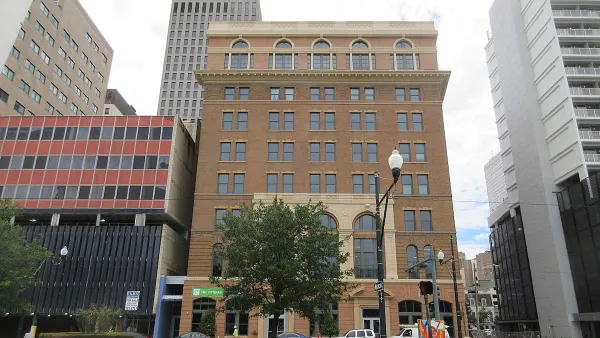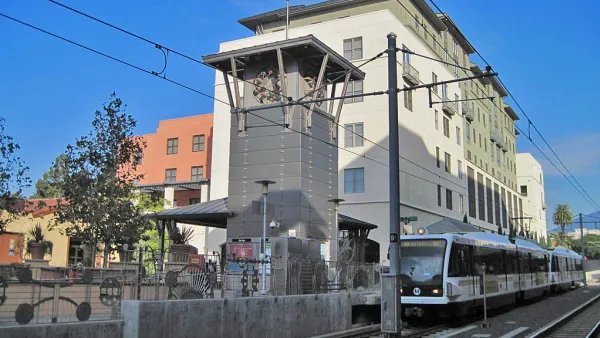From developer incentives to swapping parking for housing units, two transit systems have come up with plans that tackle the region's housing shortage and its economic inequality. What have they agreed to do, and who will hold them accountable?
A few weeks ago, we discussed the catalysts for the adoption of equity and sustainability as core principles in a new development paradigm for the Los Angeles County Metropolitan Transportation Authority (Metro), the Bay Area Rapid Transit (BART), and the Valley Transportation Authority (VTA) in the San Francisco Bay Area. With our recently adopted affordable housing policies, we are taking bold, proactive steps to address both climate and affordability challenges that high-cost regions face in California. LA Metro discussed its plan in the previous post, and here we follow up with BART and VTA.
BART: Affordability is Critical to a Bold Vision
The San Francisco Bay Area’s Sustainable Communities Strategy (SCS), Plan Bay Area (PBA) sets a bold vision to end automobile-dependent sprawl and direct the future population growth (2 million people by 2040) into already existing communities. PBA has been called the most progressive SCS in California because it meets the mandated greenhouse gas (GHG) reduction target by accommodating 100 percent of new growth (1.1 million new jobs and 660,000 new homes) within urban boundaries. PBA directs 95 percent of the region’s growth toward 5 percent of the Bay Area’s land, and two-thirds of the region’s housing production will be accommodated by only 15 Bay Area cities.
The Great Communities Collaborative, or GCC, is a multi-sector collaboration that addresses the challenges of climate change and equity by influencing local and regional policies, practices, and investments. It was founded on the idea that shaping local TOD plans and securing private and public funding to catalyze sustainable and equitable development would transform the region from auto-dependent sprawl to one made up of thriving and affordable neighborhoods linked to economic opportunities by a premier transit network. GCC realized that catalyzing BART’s and VTA’s land for more intensive development with rigorous affordable housing outcomes could significantly help accommodate the region’s growth and meet equity and sustainability goals.
GCC funded BART’s advocacy campaign, spearheaded by TransForm, an advocacy organization that promotes walkable communities with transportation choices to connect people of all incomes to opportunity, and East Bay Housing Organizations (EBHO), a nonprofit organization that aims to preserve, protect, and expand affordable housing opportunities. For over two years, TransForm and EBHO engaged BART board members and agency staff to craft policy parameters and garner support among other advocates. GCC also convened the TOD Implementation Table, a neutral space to engage with transit agency staff, other public agencies, and advocates to further their regional equity and sustainability goals and align philanthropic and public resources. Through GCC’s advocacy efforts, in 2015, BART’s Board of Directors initiated the creation of an Affordable Housing Policy.
In January 2016, the board adopted a policy requiring a minimum of 20 percent of units built on BART-owned property to be affordable. The policy requires each station area to cumulatively achieve a minimum 20 percent requirement, but leaves flexibility as to how the units are achieved so that projects can be phased in a way that makes financial sense. The affordable housing policy also includes direction to BART staff to develop a development solicitation process that favors quantity and depth of affordability, with a preference for housing units serving low- and very-low income households. Affordability is one of many requirements placed on the development of BART property. Other requirements vary by site, but universally include prevailing wage requirements and project stabilization agreements.
In addition to affordable housing policy, BART has worked over the last several months to update its decade-old TOD policy, which offers a more comprehensive policy statement. The new TOD policy, which was adopted on June 9, 2016, addresses three critical updates:
FULL STORY: California Transit Agencies Bring Affordable Housing to Scale

Analysis: Cybertruck Fatality Rate Far Exceeds That of Ford Pinto
The Tesla Cybertruck was recalled seven times last year.

National Parks Layoffs Will Cause Communities to Lose Billions
Thousands of essential park workers were laid off this week, just before the busy spring break season.

Retro-silient?: America’s First “Eco-burb,” The Woodlands Turns 50
A master-planned community north of Houston offers lessons on green infrastructure and resilient design, but falls short of its founder’s lofty affordability and walkability goals.

Test News Post 1
This is a summary

Analysis: Cybertruck Fatality Rate Far Exceeds That of Ford Pinto
The Tesla Cybertruck was recalled seven times last year.

Test News Headline 46
Test for the image on the front page.
Urban Design for Planners 1: Software Tools
This six-course series explores essential urban design concepts using open source software and equips planners with the tools they need to participate fully in the urban design process.
Planning for Universal Design
Learn the tools for implementing Universal Design in planning regulations.
EMC Planning Group, Inc.
Planetizen
Planetizen
Mpact (formerly Rail~Volution)
Great Falls Development Authority, Inc.
HUDs Office of Policy Development and Research
NYU Wagner Graduate School of Public Service




























